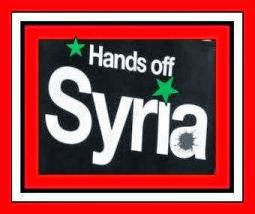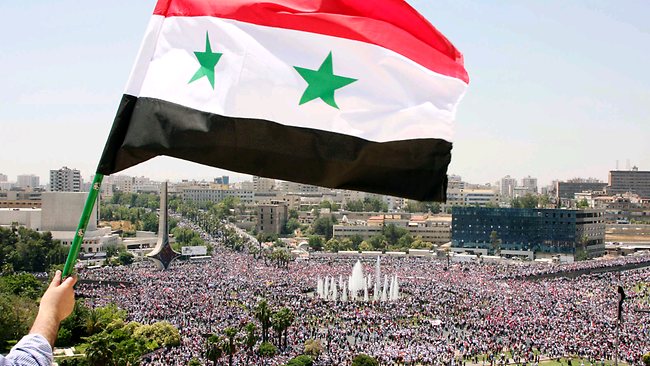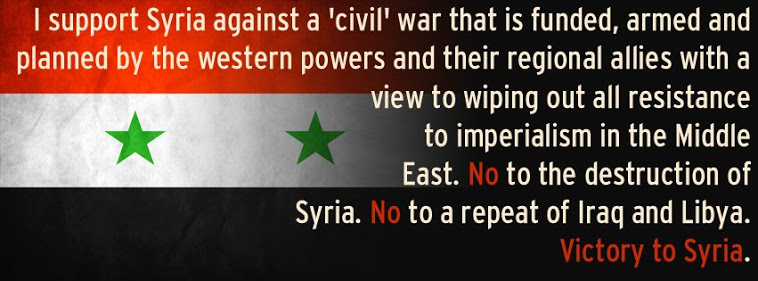by Wassim Raad and Ghaleb Kandil
Away from all the hype, and with modesty, the Syrian leadership observes the changes that occur in the world, and whose credit goes largely to the resistance of Syria.
The strength of international balances is due to the strategic outcomes of the last confrontation triggered after the announcement by the United States of their intention to strike Syria. The Syrian leadership believes that the Russian initiative on chemical arsenal aimed, at the first place, to defeat the American plan of aggression, and has not resulted in a global agreement binding Washington and its allies to stop supporting terrorists. Stopping this support by the West, Turkey and the extremists monarchies has not occurred, although this demand is high on the political and diplomatic agenda of Russia. Since she agreed to participate in the Geneva 2 Conference, Syria has received no indication that this support has stopped. Meanwhile, Saudi Arabia, Turkey and Qatar are confused because they’ve based all their calculations on the "Obama strike", which finally didn’t took place. They are victim of hysteria, especially after the information on secret contacts between some Arab and Western countries and the Syrian government to prepare the political change.
This is why the Syrian National Council (SNC, close to Turkey and Qatar), announced, on Sunday, its refusal to participate to Geneva 2. "The SNC, which is the largest political bloc in the Syrian National Coalition, made a firm decision (...) not to go to Geneva in the present circumstances" on the ground in Syria, said its president Georges Sabra. "That means it will not remain in the coalition if it goes there," he added. "If the coalition decided to go there, we will not go," insisted Mr. Sabra. In late September, the head of the Syrian Coalition, the pro-Saudi Ahmad Jarba, had told the United Nations Secretary General Ban Ki-moon that the Coalition was prepared to send a delegation to the conference, according to a spokesman for the UN.
This development illustrates the divisions between the various components of the Syrian opposition and between their regional and international sponsors.
However, trust between Syria and its international and regional partners, China, Russia, Iran and the Resistance, is solid. Damascus faced challenged with the strong support of its allies, who provide strategic military, economic and political assistance necessary to ensure its resistance. They know that the new international balance is the direct result of the Syrian resistance to the universal war for two and a half year. This help strengthen the immunity of the Syrian State against the takfirist aggression and chaos. And now, the Syrian version of events in Syria began to make its way in even the most bellicose Western countries: the Syrian state is fighting not against its own people or an armed opposition, but against extremists and barbarian mercenaries, coming from 80 countries, carrying the obscurantist Al-Qaeda thought. The Western media are no longer able to hide this fact and begin to echo the horrors perpetrated by these bloodthirsty gangs. Syrian President Bashar al-Assad himself explained in interviews recently granted to a large number of Western media, the danger posed by these groups to international peace and stability. As a result, an overwhelmingly current opposed to any war against Syria emerged in public opinion in all Western countries, according to surveys conducted by prestigious institutes.
The confidence of the Syrian leadership in his army and its capacity to multiply the success on the battleground is also very strong. This army has demonstrated an exemplary solidity, fed with loyalty and a strong popular support. Armed rebels can no longer rely on such a popular support. They are increasingly isolated from the people, who are closing ranks around the state, which continues to pay salaries and ensure services, including in the field of education, with the organization of official examinations to more than 4 million students. This is why 93,000 refugees from Lebanon and 100000 from Jordan returned to their home, the last two months.
The Syrian leadership is confident in the abilities of his army to release all parts of the country from extremist gangs. While insisting on the inevitable and inalienable nature of that objective, he refuses to set schedules and dates, leaving the military to decide the nature of operations in accordance with the requirements of the field.
Meanwhile, the Syrian state is increasing its efforts in order to isolate the extremists mercenaries, establishing contacts with dissidents who wish to return to the right path and strengthening the Defense army.
==












